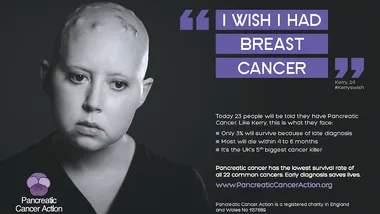Think about breast cancer and you can probably picture the type of person you think it affects.
You probably think of a woman, someone middle-aged or older, and someone with a family history of the disease. You think of the survivor – the person who has “defeated” cancer as if it is a battle to be won.
In reality, breast cancer doesn’t discriminate between the young, or people of different colours. It doesn’t stop developing if you have children, or not.
National Breast Cancer Foundation (NBCF) CEO Carole Renouf describes it as a disease of varying shades.
“Pink can have many shades, some lighter, some darker, but all the same colour … not all Pink Ribbon stories will have a happy ending, but they all deserve to be told.”
This weekend, the NBCF is doing just that, screening a special documentary entitled Shades of Pink, which explores the stories of several different cancer patients, including Mark, one of the 110 men who are diagnosed with breast cancer every year.
“I am very open about the fact I’ve had breast cancer,” he says. “When I tell other men, they are incredulous; they have no idea that men can be diagnosed with breast cancer.
“I want men to know that while breast cancer is rare for men – they can still get it.”
The documentary also tells the story of Margaret, a 57-year-old GP from Wollongong who has advanced metastatic breast cancer which means that despite any treatment she receives, she will die.
“When I was first diagnosed, I was overwrought,” she says. “All I wanted was to see my two youngest sons through their final years of school – I’ve seen one through – and I’ve made a deal with the universe to keep me here until at least the end of 2014 to see my youngest graduate … then we can talk again.
“I just take each day as it comes. I feel grateful for the time I have, and while I am always conscious that I won’t be here forever, I can’t let that dictate how I live today.’
Shades of Pink also features the story of Anke, originally from Germany, who was a single mother to baby Tessa when she discovered she had cancer.
“I was lucky in that my mother travelled over here to help during my surgery, chemotherapy and radiotherapy … I know of a number of other single women who are not as fortunate and often don’t have anyone to help them,” she says.
Breast cancer is the number one cancer for women in Australia, with an estimated 15, 380 people expected to be diagnosed with the disease this year alone.
“While most women survive breast cancer, around seven women die every day from the disease in Australia. We are committed to changing this – through more research,” Renouf says.
Hope is the most important thing for cancer sufferers, even people like Margaret, who know their time is limited no matter what happens.
“Research has created a significant difference to cancer outcomes – and I know if we find the answer to one, we will smash them all,” she says.
“I constantly battle with unhelpful thoughts about my time left – I feel consumed with guilt that my sons will have to watch me die – but I can’t let that define the rest of my time here.
“I hope this documentary can give people with secondaries hope that their quality of life can be there. Research is cancer’s Achilles heel, and my way of fighting back is to be here today.”
Shades of Pink screens this Saturday, March 1, at 3pm on Channel 10.



